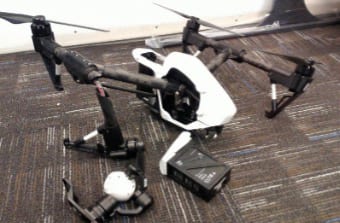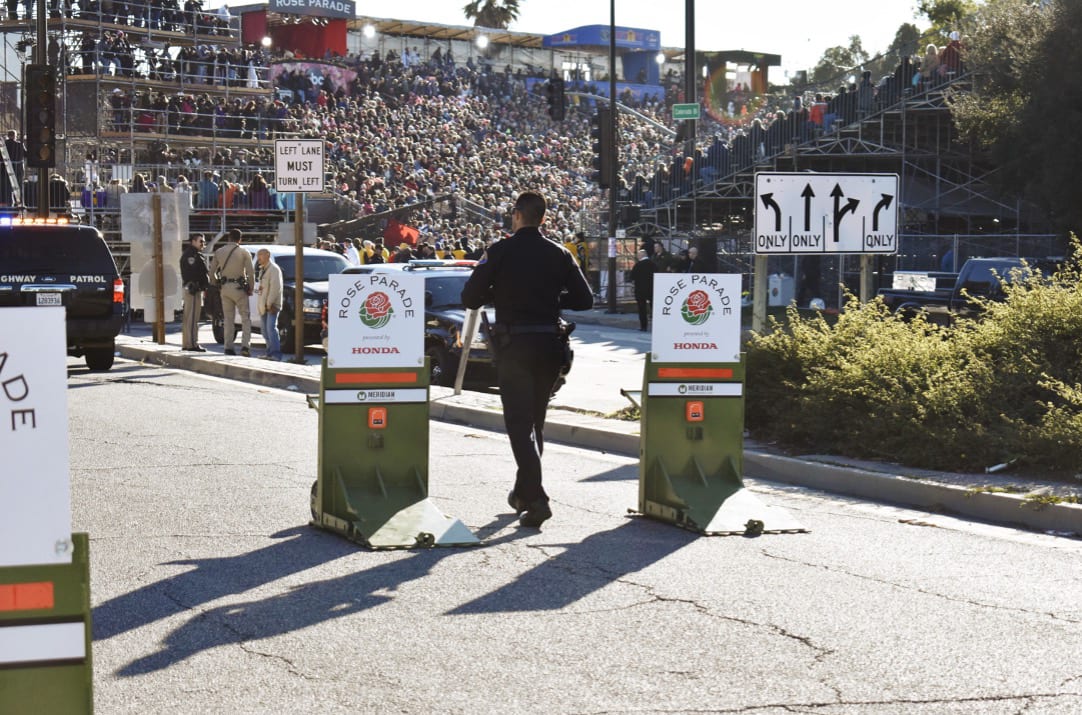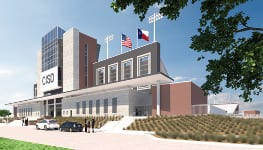SDM exclusive
Meet the Finalists for the 2021 Golden Eagle Award

The awards program from the National Center for Spectator Sports Safety and Security, sponsored by SDM, recognizes excellence in system integration at sporting venues. These are the 2021 finalists.
By Laura Mazzuca Toops, SDM Managing Editor
The years 2020 and 2021 were tough ones for the sporting world, and the effects of a global pandemic are still rippling through sports stadiums across the country, especially the smaller venues. But in spite of the rush to a new normalcy, most spectators are still concerned about safety and security. According to the National Center for Spectator Sports Safety and Security (NCS4)’s 2021 Spectator Sports Safety & Security Survey, 73.2 percent of respondents consider safety and security measures when deciding to attend an event, and 77 percent prefer these security measures to be visible at the event.
In its ongoing commitment to the safety of spectators, property, and infrastructure, the NCS4 at The University of Southern Mississippi (USM) presents the 2021 Golden Eagle Award. Sponsored by SDM and Security, the award recognizes excellence in systems integration, architecture, engineering, and/or construction (A/E/C) specifically related to the safety and security of spectators, property, and infrastructure of spectator event facilities.
“In addition to addressing security gaps, solutions must prioritize fan experience and safety,” says Daniel Ward, MBA, CEM, NCS4 director of training and exercise. “The Golden Eagle Award is an opportunity for our industry to recognize those technologies, services, and processes that meet security needs and effectively account for the unique operating environment created by sporting and entertainment events.”
Award criteria focuses on the design and functionality elements that promote the safety and security of all stakeholders. NCS4 invited applicants from leading systems integration, architecture, design, engineering, and consulting firms to submit case studies from successful projects with safety and security front and center in planning and execution.
A team of subject matter experts selected three finalists to present their case studies at the 12th Annual National Sports Safety and Security Conference & Exhibition on Nov. 9-10 in Phoenix.
The judges reviewed all submissions and scored each case study on the following criteria:
- Solution relevance to the sport industry.
- Solution effectiveness in solving the identified problem(s).
- Solution contribution to the balance of fan experience and safety/security.
- Solution utilization of creativity, innovation, and technology in a way that leads the industry forward.
The Golden Eagle Award presentations will take place at the conference on Tuesday, Nov. 9, where conference attendees will cast their votes for the winning entry. The Golden Eagle Award winner will be announced at the awards luncheon the following day by Gary Merrill, publisher of SDM and Security.
The top three Golden Eagle Award submissions are:

NCS4 GOLDEN EAGLE AWARD NOMINEE
911 Security
Sports venue: Kroger Field Stadium, University of Kentucky, Lexington, Ky.
The University of Kentucky (UKY) campus was seeing more unapproved drone activity — including a drone at the 2017 football season opener that flew into the stadium and crashed into a VIP area. After pilot trials of several different systems, Chief Joe Munroe concluded that 911 Securities Drone Detection Platform outperformed others and was “the most cost effective and best solution on the market.”
UKY police department (UKYPD) deployed Company D’s AirGuard system, a purpose-built airspace management platform for real-time detection and visualization of drone actions and mitigation of drone threats. It manages electronic sensor hardware, including DJI Aeroscope RF detection, 911 Security directional-finding RF sensors, Fortem radar sensors, Axis PTZ cameras, and Salient Systems VMS.
UKYPD used AirGuard to set up virtual geofences around UKY grounds, Kroger Field, and the university’s level 1 trauma hospital. Once a drone is detected, AirGuard AI automatically classifies the risk and, within a second, alerts security with options to mitigate the threat. UKYPD can immediately share the exact drone and pilot location information with other PD members using a phone app.
Because the campus has expansive drone-research programs, many authorized flights occur regularly. The drone detection system helps the campus enforce its drone policies and ensure the security of the airspace. Each morning, the team generates a report of the day's authorized drone flights, using these reports to approve flights in AirGuard.
By monitoring manned and unmanned aircrafts, UKYPD can scrutinize activity, then send alerts of a possible crash before it happens. By deploying AirGuard, UKYPD is proactively interrupting danger before it happens and guarding fan enjoyment at sporting events.

911 Security Drone

NCS4 GOLDEN EAGLE AWARD NOMINEE
Meridian Rapid Defense Group
Sports venue: Tournament of Roses Game and Parade, Rose Bowl Stadium, Pasadena, Calif.
Meridian Rapid Defense Group provided vehicle mitigation to the City of Pasadena for the 2020 Tournament of Roses Parade and to the Rose Bowl Stadium for the 106th Rose Bowl Game, covering several activity zones with a series of objectives in various points and time periods throughout the event.
The annual Tournament of Roses Parade and Game on New Year’s Day is a Dept. of Homeland Security Special Event Assessment Rating (SEAR)-1-level security event with a large footprint and complex traffic scenario that requires coordination and consensus-building at the local, state, and federal levels.
Past events had relied on traffic management products like water barriers and type 3 barricades that are not certified to stop errant vehicles. Meridian deployed 443 Archer 1200 barriers across three primary locations: Rose Bowl Stadium, the parade route, and the command center. Archer barriers are SAFETY Act-certified and crash test rated to stop hostile vehicles while also being both mobile and modular. This allowed for the event perimeter to be closed in a fraction of the time and reopened to regular traffic flow quickly.
Meridian staged the barriers along the parade route and at the stadium a week before the event, allowing law enforcement, local businesses, and the public to become familiar with the new solution. Fliers were distributed to every business near deployment, and company websites were showcased on the barriers to allow people to familiarize themselves with the product.
Because of the synchronized closing and opening, Meridian staff was divided into nine teams working in tandem to quickly deploy and remove the barriers, which were staged adjacent to closure points. The teams spread out to effectively close the route and then reopen simultaneously. The barriers’ modularity could also accommodate different street widths or unique access points, allowing street closure to vehicles while fully permeable to pedestrians.

IMAGE COURTESY OF MERIDIAN RAPID DEFENSE GROUP

NCS4 GOLDEN EAGLE AWARD NOMINEE
VLK Architects Inc.
Sports venue: Crowley Independent School District Sports Complex, Crowley, Texas
The Crowley ISD Sports Complex is the city’s first districtwide stadium that will serve its two high schools. Located adjacent to Fort Worth, Texas, Crowley’s population has grown nearly 30 percent in the last 10 years. The state-of-the-art sporting events venue and its adjacent field house, projected to be completed by July 2022, will accommodate up to 8,000 spectators plus teams on the field.
District stakeholders identified safety and security among the critical goals for the site. They hired VLK Architects to provide architectural design services that include master planning, programming, and athletic stadium design.
The paramount objective of the stadium’s architectural design is incident prevention. VLK toured with Crowley ISD leaders around area stadiums, evaluating how they addressed safety and security through architectural design.
The finalized safety and security strategies for the CISD Sports Complex applies crime prevention through environmental design principles, VLK Architects best practices, and the policies and practices of the district’s first responders.
Critical design elements include perimeter, vehicular, and pedestrian solutions. Perimeter design incorporates landscaping at the four corners of the stadium, with direct access to the field shielded with berms. Vehicular drives were designed to separate home- and visitor-side spectator traffic. Bus parking for fine arts and athletic teams is located at opposite ends of the stadium. The delivery path for concessions is distanced from the stadium’s main gate. Fencing is designed to deter climbing over the fence.
At the main gates, VLK allotted ample space for staging metal detectors and bag check stations. A continuous bridge inside the stadium connects the concourse levels, allowing district police to station at all four corners of the stadium. Strategically located holding rooms in the stadium are designed to remove and isolate any human threat from spectators. Ample lighting is provided throughout the site, including the parking lot, around the stadium, and at the concourse level. To address severe weather threats, the Thor Guard lightning prediction and warning system will be incorporated to protect the players and spectators from lighting strikes.

